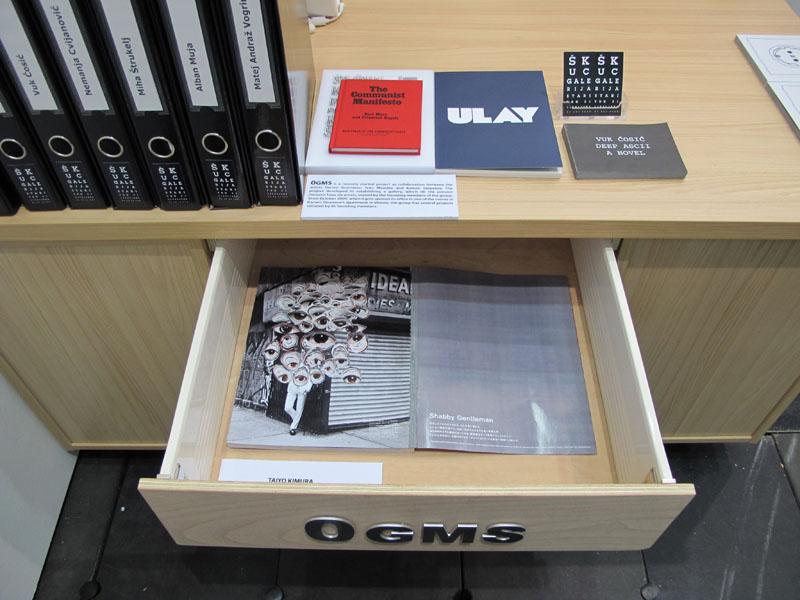Interview with Ivan Moudov (Interview)
 Ivan Moudov lives and works in Sofia. He was educated at the National Academy of Fine Arts and at the High School of Applied Arts, both in Sofia. Solo exhibitions in Zurich, Verona, Prishtina, Braunschweig, Sofia, Trieste, Milan, and Stockholm. He participated in the 2007 Venice Biennale, the 1st Moscow Biennial, and in Manifesta 4, among many other group shows.
Ivan Moudov lives and works in Sofia. He was educated at the National Academy of Fine Arts and at the High School of Applied Arts, both in Sofia. Solo exhibitions in Zurich, Verona, Prishtina, Braunschweig, Sofia, Trieste, Milan, and Stockholm. He participated in the 2007 Venice Biennale, the 1st Moscow Biennial, and in Manifesta 4, among many other group shows.
Pavlina Mladenova: You are participating currently in a group exhibition entitled Beyond Credit – Contemporary Art and Mutual Trust in Istanbul, which is one of the significant events of Istanbul European Cultural Capital 2010, with curators Maria Vassileva, Iara Boubnova, Luchezar Boyadjiev. What is the nature of your participation in this exhibition?
Ivan Moudov: Yes, it was an exhibition with a lot of artists and a lot of attractive works, I was just one of them and my work was not so attractive. It was a video documentation of a project I realized in Zurich. It’s called “Garbage”. I was transporting Swiss household waste to Germany.
PM: Can you describe shortly your point of view on the current art scene in Bulgaria?
IM: It is nice and compact… too compact I’m afraid. A big part of it is abroad.
PM: Which of your art works do you find most influenced by the Bulgarian cultural background?
IM: I guess all of them. MUSIZ in particular is working a lot with the local context. I wanted to focus public attention on a certain problem – a missing museum. I wanted to start a public discussion. I managed to do it quite easily – all it took was one week of preparation. I organized the fake opening of a new Museum for Contemporary Art (MUSIZ) in an old railway station in Sofia and invited more that 400 people to it. When the guests arrived, there was nothing there but other people waiting for their trains. Afterwards, there were a lot of organizations who announced they were going to work towardscreating a museum, but it was just cheap PR. Nobody in Bulgaria wanted a museum for contemporary art. And that’s OK. It was shocking for me when I came to this conclusion but I’ve accepted it now.
PM: Do you think the cultural institutions in Bulgaria manage to build a true awareness of contemporary art among the population? Can you list institutions in Bulgaria that think are successful in doing this?
IM: That’s not possible and maybe it is not necessary. I am not sure that there is something like “true awareness”, it is what it is. The important institutions are ICA – Sofia, Vaska Emanouilova Gallery, Sofia City Art Gallery, The Fridge, Art Today Assosiation and AAD foundation.
PM: For me personally it is amazing how in your work you play with space — constructing it, and mixing it in with your work. What is the most ideal space for you?
IM: I don’t have preferences. Each space has its good side.
PM: What is your audience? Do you think you appeal to a certain audience? Is there an audience to which you wish to address yourself?
IM: I don`t know. I count on the audience of the institutions where I exhibit.
PM: Some of your international participations have provoked a lot of negative judgment in Bulgaria. How do you receive such negative criticism? Can you remember any concrete examples?
IM: The only negative judgment is no judgment and you know I can’t give you an example of that.
PM: Tell me more about your Fragments project, your collection of art fragments that you stole over the years from different museums and galleries and then placed in boxes so they could become a personal traveling collection. You have said that you feel sentimental about the collected pieces and you are afraid that you might lose them, that they might be stolen from you. What kind of reactions did you get when you showed this collection?
IM: Fragments was a very long project by my standards. I started it shortly after I graduated as an arts student. In the beginning, I was stealing everything I could possibly get my hands on. My collection looked more like a curiosity cabinet. Later, when I gained confidence, I started to have preferences, and in the end I became quite choosy – I was only stealing what I liked. Stealing is just one of the aspects in Fragments. I’m more interested in the business of collecting and the institutional troubles the work created. The stealing was just a tool. At the end of the project a lot of artists were asking me to exhibit them in the boxes.
PM: Some years ago I attended an impressive presentation of unrealized projects by a Spanish artist. It appears as if many artists today are in the business of collecting their unrealized projects or ideas. Do your have such a collection? If yes, what are the reasons why these ideas were not realized?
IM: That sounds like a good theory. Maybe it is more like works of which I wish that they had been made by me. There is a different motivation in collecting. It could be like taking scalps. Anyway, collecting is sick.
PM: You have recently launched a collaborative project called 0GMS – a mobile gallery with a few other artists. Tell me more about this, please.
 IM: Together with Kamen Stoyanov and Steven Guermeur we have opened a gallery called 0gms. The number “0” in the name of our group is a presentation strategy: like this, our group is always on top of the gallery lists at art fairs, biennials, and other art platforms. 0gms gallery is situated in a drawer in the kitchen of ICA, the Institute of Contemporary Art in Sofia. We also decided that we could create a series of gallery drawers at different institutions all over Europe. We have now opened our second drawer space at the shop of Cabaret Voltaire in Zurich, and we are planning to open drawers in Bucharest, Istanbul, Paris, and Belgrade. The gallery works with six artists invited by the founding members of the group.
IM: Together with Kamen Stoyanov and Steven Guermeur we have opened a gallery called 0gms. The number “0” in the name of our group is a presentation strategy: like this, our group is always on top of the gallery lists at art fairs, biennials, and other art platforms. 0gms gallery is situated in a drawer in the kitchen of ICA, the Institute of Contemporary Art in Sofia. We also decided that we could create a series of gallery drawers at different institutions all over Europe. We have now opened our second drawer space at the shop of Cabaret Voltaire in Zurich, and we are planning to open drawers in Bucharest, Istanbul, Paris, and Belgrade. The gallery works with six artists invited by the founding members of the group.
PM: I want to stay for a moment with your collaborative work, which also includes residency programs as well as other joint art works. What does it mean for you to work with other people?
IM: I am not good at working with other people. In the beginning I am enthusiastic then I leave.
PM: What is Sofia to you? Do you think that in order to succeed as an artist in Bulgaria you have to live in the capital? Have you ever considered leaving Bulgaria?
IM: Sofia is a complex place. When I am here I hate it, when I am abroad I love it. I prefer to love it.




